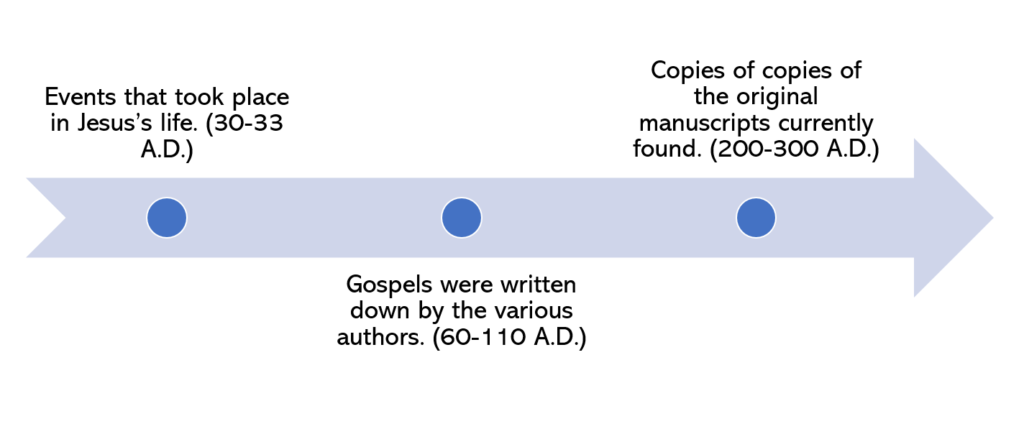
Most modern literary scholars would agree that the Bible is one of the finest pieces of literature circulated in 21st century. The Bible is the most printed and sold book in the world. Also fun fact for the day, the Latin Bible was the first piece of book printed by the Gutenberg printing press. But what really sets apart the Bible from any other piece of literature/religious texts is the BOLD claim it makes about itself.
All Scripture is God-breathed and is useful for teaching, rebuking, correcting and training in righteousness
2 Timothy 3:16 NIV version
The bible (scriptures) claims to be the very words that were spoken by God. It is not only a book that teaches us to live moral upright lives (I’m sure there are lot of self-help books) but it records the very words of the creator of the universe.
I understand that it take a massive leap of faith to consider the Bible as the very words of God. In this blog post, my hope is that I can get you started on the journey to verify this claim. This is also a followup to my previous blog post on Jesus’s divinity claims. Check it out at this link if you haven’t yet.
Given the vastness of the Bible, I want to focus on verifying the claim for the segment of the Bible that records the life of Jesus Christ. They are collectively called the gospels. In essence, the gospels are historical documents. An historical document records facts about a person, place or an event. It is not the author’s opinion or interpretation. In the same way, the gospel writers did not write about what they believed but rather they wrote about what they saw. If we had to draw a timeline for the gospel documents, it would look like this.

In order to verify if a historical document is reliable, we need to answer the following two questions:
- Did the author record the events in the document accurately?
- Are the contents of the documents reliably preserved for us?
Let’s try to answer these questions for the gospels.
Did the author record the events in the document accurately?
To answer this question, I want to subject the gospel writers to three tests. The gospel writers would have to earn a “PASS” in all the following tests to give a satisfactory “YES” to this question.
Did the authors have access to the information they recorded?(ACCESS TEST)
The four gospels were either written by eyewitnesses (Matthew, John) or by ones (Mark, Luke) who had access to the eyewitnesses. A big distinction between the gospels and other contemporary religious texts is that most events recorded in the gospels happened in public and in broad daylight among many witnesses including the eyewitnesses above. In modern day criminal investigation process, eyewitness testimony plays a pivotal role in determining the outcome of a case. Given the importance of an eyewitness testimony, I think it would be unfair to dismiss the gospels without further investigation.
What were their motives behind writing the gospel?(MOTIVE TEST)
In the gospel of Luke, the writer states his motive for writing his gospel.
Many have undertaken to draw up an account of the things that have been fulfilled among us, 2 just as they were handed down to us by those who from the first were eyewitnesses and servants of the word. 3 With this in mind, since I myself have carefully investigated everything from the beginning, I too decided to write an orderly account for you, most excellent Theophilus, 4 so that you may know the certainty of the things you have been taught.
Luke 1:1-4 NIV version
From the above passage, it seems that the intention of the author was to present their readers with the truth alone and the author seems to have done his due diligence to make sure the information was accurate and reliable.
But what if the authors did manipulate the information and just added the above passage with no truth behind this statement. If the writers were really that cunning and manipulative, it does not make any sense as to why the authors decided to share many embarrassing details involving the early church leaders (including themselves) and possibly taint their reputation. I have added one such passage below from a myriad of events where I don’t think the authors were doing a good job selling their story.
54 Then seizing him, they led him away and took him into the house of the high priest. Peter followed at a distance. 55 And when some there had kindled a fire in the middle of the courtyard and had sat down together, Peter sat down with them. 56 A servant girl saw him seated there in the firelight. She looked closely at him and said, “This man was with him.”57 But he denied it. “Woman, I don’t know him,” he said. 58 A little later someone else saw him and said, “You also are one of them.”“Man, I am not!” Peter replied. 59 About an hour later another asserted, “Certainly this fellow was with him, for he is a Galilean.” 60 Peter replied, “Man, I don’t know what you’re talking about!” Just as he was speaking, the rooster crowed. 61 The Lord turned and looked straight at Peter. Then Peter remembered the word the Lord had spoken to him: “Before the rooster crows today, you will disown me three times.” 62 And he went outside and wept bitterly.
Luke 22:54-62 NIV
The above passage highlights the character flaws of the early church leader Peter who is widely acknowledged as a pillar of the Christian faith. If the authors did alter the story, then they have done a lousy job in portraying the leaders through whom the Jesus movement took off in the first century. The only conclusion I can make from these “not so great” events mentioned in the Bible is the authors did record the TRUTH.
Did the writers have the ability to record the events accurately?(ABILITY TEST)
The first gospel to be written down was the gospel of Mark in ~ 64 A.D. thirty years after Jesus’s death. Even though the authors had access to the information they recorded but it was not until 30 years later that the events were written down on paper. In my opinion, 30 years is a lot a time and it is possible that the memory of the authors may not have stayed reliable over that time span. But, this is where oral tradition comes to the rescue. Before the gospels were written down, the contents were circulated all around the known world through word of mouth. In order to ensure the accuracy of the information transmitted, the community designates certain individuals to bear the responsibility of preserving the gospel message of Jesus. It was common for Jewish teachers to subject large portions of scriptures to memory.
This brings us to our second question.
Are the contents of the documents reliably preserved for us?
In my opinion, this question is straightforward to answer than the first one. Below, I have added a flowchart that roughly represents how the gospels were transmitted (note that intention of the flowchart is to convey my point. The geographical locations and number of copies used are not precise) :

In the flow chart, the original manuscript of the gospels were taken and multiple copies were made in different language and different locations. Today, we do not have any surviving copies of the original Greek manuscripts. But we can still be confident that the Bible we read matches the original manuscripts. This is because of the plethora of copies of copies (third level in the flowchart) that have been found in various geographical places. In the flowchart, I have listed 6 copies of copies that have been discovered. It is possible that not all 6 match each other in it’s content. However, it is easy to resolve the difference. If out of the 6 copies, 4 copies share the same exact information, we can be confident that 4 copies are more reflective of the original scripts. In fact most translations of the Bible take a conservative approach where they make sure to provide additional information of various verses if different sources differ in content.
If you have read so far, it means that you have put yourself in Neo’s shoes from the Movie Matrix where Morpheus asks Neo to choose between the red pill and blue pill. The blue pill would mean that you can forget about your last 10 minutes and keep living the way you like (blissful ignorance) or if you take the red pill, it would mean that you would have to pay careful attention to what the Bible says and treat them as the very words of God or at least verify the claims I have made in this blog. Pick one!
In this blog, I have primarily focused on building a case for the gospels. One reason for this, if you are new to the idea of reading the Bible, the gospels are a great place to start. The gospels record the life, death and resurrection of Jesus Christ and is the foundation of the Christian faith. I would recommend reading the book of Mark, a concise biography of Jesus that can be read in less than a day.
Lastly, I want to acknowledge Lee Strobel whose book The Case for Christ has played a huge role in writing this blog and so many other Christian apologist that I have listened to over the years. Truly, I am standing on the shoulders of giants.


4 Comments
MARVEL DOSS · July 1, 2020 at 2:36 am
I have chosen the Red pill. The book of ‘Case for Christ ‘ is a must read.
Abhishek Bhogal · July 2, 2020 at 5:44 pm
This was really helpful and you have built a pretty strong case. Appreciate your efforts man… Stay rooted and Keep growing.
Michelle G · July 2, 2020 at 7:56 pm
Great work Richard!
Brian · July 6, 2020 at 8:21 pm
Thanks Richard, great job.
Another key point is that their intention was to convert people, especially the Jews. If they were liars, making stuff up to convert people, would they have used a poor, unschooled, humble dead guy as their leader, And say that the first witnesses to his greatest miracle (Resurrection) were lowly women, whose opinion meant nothing. And trying to convert people, would these liars have preached a message of selflessness, humility, hate family… their message would only bring loss of friends and family, Being ridiculed by society, loss of money and social status, torture, and often death (martyrdom). Maybe one psycho would make up something like that; would many Lying writers and a whole community hold to such difficult teachings if they were trying to convert people?.. and look at the character of these writers, is there anything that suggests these are not genuinely loving people with the utmost integrity? the best conclusion based on the evidence is that these Writers are not liars, and therefore are telling the truth. They were radically transformed by Jesus